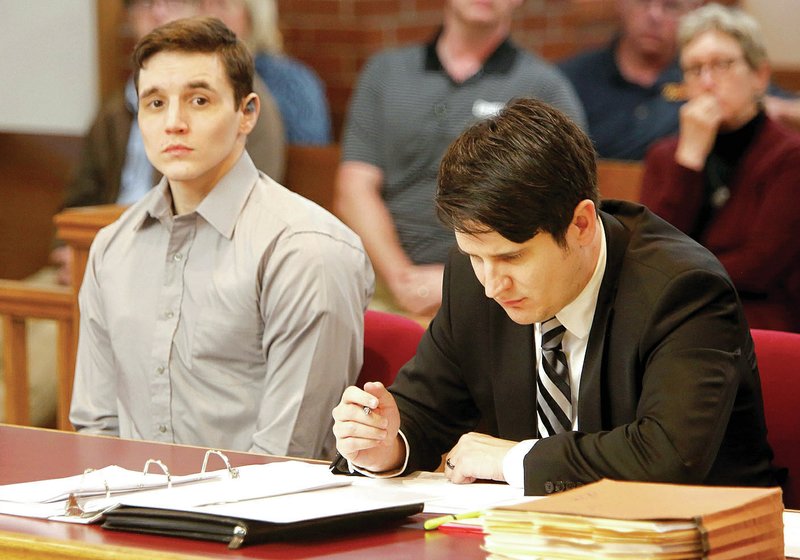FAYETTEVILLE -- Samuel Robert Hill was convicted Wednesday afternoon on the lesser charges of first-degree murder for gunning down his stepfather and attempted first degree murder for trying to kill his mother.
Hill, 27, was charged with capital murder for killing Allen Hill, 61, at the elder Hill's home on Whitehouse Road near Elkins the night of Aug. 20, 2014. He also was charged with attempted capital murder for shooting at his mother, Roberta Hill.
Legal lingo
Penalty phase
Refers to the part of a trial when the fact finder determines the punishment for a defendant who has been found guilty. In Arkansas, the jury makes a non-binding sentencing recommendation to the judge. This is also referred to as the sentencing phase.
Source: uslegal.com
Washington County Circuit Judge Mark Lindsay told the jury to return at 10 a.m. today to decide Hill's sentence.
Hill faces 10 to 40 years or life in prison on each count. Hill faced a mandatory life term had he been convicted of capital murder.
The jury took just less than three hours to reach a verdict. Hill didn't testify.
The defense didn't dispute he killed his stepfather. His lawyer argued Hill suffered from schizophrenia and urged jurors to return a verdict of not guilty by reason of mental disease or defect.
The case boiled down to which psychologist the jury would believe.
Virginia Krauft, testifying for the defense Tuesday, said she diagnosed Hill with schizophrenia and other mental diseases that made him incapable of appreciating the criminality of shooting his stepfather to death.
Prosecutors rebutted with their expert, Jennifer Boye, who did a court-ordered examination of Hill at the Arkansas State Hospital.
"I work with people with schizophrenia every day," Boye told jurors Wednesday morning. "I saw no evidence that Mr. Hill was suffering from schizophrenia. I see no evidence to support that diagnosis."
Boye said she would have expected to see some degree of impairment in Hill's daily life if he had schizophrenia, but that didn't appear to be the case.
"It's not like a light switch you can turn off and it will go away," Boye said.
She told jurors her diagnosis was Hill suffers from borderline personality disorder, which doesn't rise to the level of a statutory defense under Arkansas law. Boye also said Hill has an unspecified eating disorder.
Hill had a history of losing his temper and getting into fights, Boye noted. Borderline personality disorder has, among other symptoms, mood swings, unstable and impulsive behavior and intense anger, she told jurors.
Boye concluded Hill had the legally required capacity to conform his behavior to the law and could appreciate the criminality of his actions.
"You can have a mental disease, but the question is, does it affect his ability to know right from wrong?" Prosecutor Matt Durrett told jurors in his closing argument.
Durrett said Hill chose to get a gun, holster and ammunition from his closet, drive 20 miles to his parents' home, kick the door in and shoot Allen Hill. He left, reloaded his gun, returned to the house and fired on his stepfather and mother a second time. Durrett said Hill only stopped when Allen Hill returned fire and shot him in the hip.
"He had the premeditated and deliberate purpose of going to that house and killing his parents," Durrett said.
John Baker asked the jury to find his client too mentally ill to be held accountable for his actions. He also told jurors the state would provide proper treatment and supervision for Hill in that scenario.
"If you think in two weeks they're gonna give him a bottle of pills and send him home, that's not realistic," Baker said. "He's mentally ill. No one chooses to be mentally ill any more than they choose to be epileptic or diabetic."
Hill told investigators during an interview played for the jury he vaguely remembered standing on his parents' porch with a gun in his hand and said he kept seeing "flashes" the night he killed Allen Hill. Hill said he was blacking out and could remember little else about the incident.
Durrett pointed to the testimony of Hill's former father-in-law Bobby Perkins, who told jurors Hill came to his house that night and said he'd shot Allen Hill. He also told Perkins he shot 32 times and still had 16 rounds left and that he had "lost everything."
"That shows he knew what he did and that he knew he was in trouble," Durrett told jurors. "There was no sign of memory loss."
Allen Hill was shot six times, including two fatal slugs through his lungs, a state medical examiner told jurors. He also was hit in the face, back, right shoulder and left foot. Roberta Hill escaped the carnage by crawling out a back bedroom window and hiding until police arrived.
Investigators found 19 shell casings from Sam Hill's gun at the house. There were 15 bullet holes in the front screen door, some from Sam Hill's 9 mm gun going in and others from Allen Hill's .45 going out. Investigators found eight bullet holes going into a bedroom window and more on the porch and inside walls of the home.
NW News on 05/19/2016
